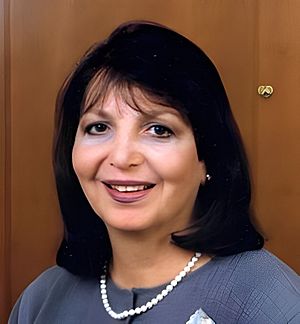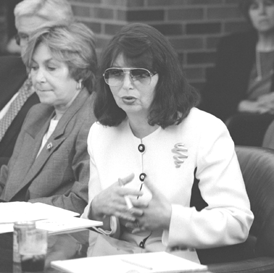Huda Akil facts for kids
Quick facts for kids
Huda Akil
|
|
|---|---|
 |
|
| Born | May 19, 1945 Damascus, Syria
|
| Nationality | Syrian |
| Citizenship | United States of America |
| Known for | Systems Neuroscience, Stress Induced Analgesia, Neurobiology of emotions and mental health disorders |
| Spouse(s) | Stanley Watson |
| Awards | / Gruber Prize in Neuroscience (2023) / National Medal of Science (2023) Member: |
| Scientific career | |
| Fields | Neuroscience |
| Institutions |
|
| Thesis | Monoaminergic mechanisms underlying stimulation-produced analgesia (1972) |
Huda Akil (Arabic: هدی عاقل; born in 1945) is a Syrian-American neuroscientist. A neuroscientist is a scientist who studies the brain and nervous system. Her research has helped us understand how our brains handle emotions like pain, worry, sadness, and even how people might become dependent on certain substances.
Dr. Akil and her team are famous for finding the first proof that special chemicals called endorphins work in the brain. They showed that stress can make these endorphins active, which can then help reduce pain.
She is currently a special professor of Neurosciences at the University of Michigan Medical School. She also used to lead a research group with her husband, Stanley Watson. Dr. Akil is part of a special team called the Hope For Depression Research Task Force. This group uses the newest knowledge in genetics (how traits are passed down), molecular biology (how tiny parts of cells work), and brain imaging to find better ways to understand and treat depression and other mood problems. She has won many awards and was even the President of the Society for Neuroscience, which is the biggest group for brain scientists in the world.
Early Life and Education
Huda Akil was inspired to become a scientist after reading a book about Marie Curie. Marie Curie was a famous physicist and Nobel Prize winner. This book made Akil realize that a woman from anywhere could become a great scientist.
She went to the American University of Beirut in Lebanon. She received a scholarship that required her to get top grades. This was hard because she was not fluent in English. But she did it! She graduated in 1967 with a degree in Psychology. Akil was first interested in how language works in the mind. This interest came from her father, who was also a psychologist.
After graduating, Akil taught for a year at the same university. Then she moved to the United States. She continued her studies at the University of Iowa. There, she learned about the basics of brain science and medicines. She found it very interesting. She then did research on learning.
Later, Akil was accepted to the University of California, Los Angeles. She worked on pain research there. After getting her Ph.D., she joined a lab at Stanford University.
Career and Research
Dr. Akil's research covers many different areas, but they all connect to understanding emotions. Throughout her career, she has studied how the brain responds to pain, how different parts of the brain work together, and how brain chemicals affect our feelings. She also studies serious mental health conditions. Dr. Akil says, "It has always been about trying to understand the circuits of emotions." She loves learning how our experiences change the brain and how the brain then changes how we see the world.
In 1970, Dr. Akil joined John Liebeskind's lab at UCLA. He was interested in how the brain handles pain. His lab noticed that sometimes, electrical stimulation could actually reduce pain instead of making it worse. This discovery inspired Dr. Akil and another student, David Mayer, to study this more. They called it "stimulation produced analgesia" (SPA). Analgesia means pain relief.
They worked with rats and found that stimulating certain areas of the brain could stop the rats from reacting to painful things. But it didn't affect their other senses. This idea of SPA became the main topic of Dr. Akil's Ph.D. work. Later, in 1977, they made another big discovery. They found that a medicine called naloxone could partly stop the pain relief caused by brain stimulation. .....
Dr. Akil and her colleagues at Stanford University then found that these natural pain-relieving substances were endorphins, especially two small proteins called enkephalins. ..... This increase happened at the same time as a decrease in how much pain the rats felt.
..... She worked with her husband, Stanley Watson, who is a psychiatrist. ..... They also looked at how stress affects anxiety and depression. They were the first to show that in people with depression, the brain's response to stress hormones is different.
Today, Dr. Akil's lab is creating animal models to understand how genetics and development affect a person's natural personality. ..... Many scientists who trained in Dr. Akil's lab, like Dr. Shelly Flagel, have gone on to open their own successful research labs.
Honors and Awards
Dr. Akil is a highly recognized scientist who has received many awards throughout her career. In 1993, she received the Pacesetter Award from the National Institute on Drug Abuse. The next year, she and Stanley Watson shared the Robert J. and Claire Pasarow Foundation Medical Research Award for Neuropsychiatry.
In 1998, she was honored with the Sachar Award from Columbia University. She also received the Bristol Myers Squibb Unrestricted Research Funds Award. In 2006, she accepted the John P. McGovern Award in Behavioral Sciences. In 2007, she received the Mika Salpeter Lifetime Achievement Award and the Patricia Goldman-Rakic Prize for Cognitive Neuroscience from the Society for Neuroscience.
More recently, Dr. Akil has continued to earn awards for her research. These include the Paul Hoch Distinguished Research Service Award in 2010, the Sarnat Prize in 2012 (with Stanley Watson), and the AAMC 2013 Award for Distinguished Research in the Biomedical Sciences. In 2023, she was awarded the prestigious Gruber Neuroscience Prize and the National Medal of Science.
Dr. Akil is a member of several important scientific groups, including the National Academy of Sciences and the American Academy of Arts and Sciences. She has also served as President of the American College of Neuropsychopharmacology (1998) and President of the Society for Neuroscience (2004). She currently helps lead the Neuroscience Steering Committee at the Foundation for the National Institute of Health.
Family Life
Huda Akil is married to Stanley Watson. They both work at the University of Michigan Medical School, where they co-direct the Molecular and Behavioral Neuroscience Institute. They have both played a big part in each other's careers. The couple has two children, Brendon (who is also a neuroscientist at the University of Michigan) and Kathleen. Dr. Akil has said that she approached raising her children with great energy, balancing her career and family life at the same time.
See also
 In Spanish: Huda Akil para niños
In Spanish: Huda Akil para niños


